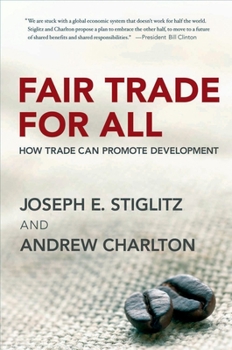Fair Trade for All: How Trade Can Promote Development
Select Format
Select Condition 
Book Overview
Winner of the Nobel Prize in Economics and author of the New York Times bestselling book Globalization and Its Discontents, Joseph E. Stiglitz here joins with fellow economist Andrew Charlton to offer a challenging and controversial argument about how globalization can actually help Third World countries to develop and prosper.
In Fair Trade For All, Stiglitz and Charlton address one of the key issues facing world leaders today--how can the poorer...
Format:Paperback
Language:English
ISBN:0195328795
ISBN13:9780195328790
Release Date:September 2007
Publisher:Oxford University Press
Length:352 Pages
Weight:1.15 lbs.
Dimensions:0.7" x 5.7" x 8.8"
Customer Reviews
5 ratings
Enlighting book
Published by Thriftbooks.com User , 17 years ago
Read it. It did taught me a lot about economic premises discussed in class. Prof Stiglitz is great. The book addresses topics I was supposed to hear in other business courses but this book really nailed it
A radical new trade model
Published by Thriftbooks.com User , 18 years ago
The authors state rightly that trade policies should be designed to raise living standards and to integrate developing countries into the world trading system. Global poverty (more than 2 billion people live on less than a dollar a day) is the world's most pressing problem. They say rightly that the developed countries have to date received the lion's share of the benefits from previous trade negotiations. Those ought to do more for the developing countries. The adage should be `help-my-neighbor', nor `beggar-my neighbor'. Right should persevere over might. Therefore they want to put a radical new trade model on the table of the Doha Round: the Market Access Proposal (MAP). Their model is simple and straight: All developing countries can have free access to all markets with (1) a larger GDP (Gross Domestic Product) and (2) a larger GDP per capita. Besides MAP, they give also recommendations for the upcoming trade negotiations, of which many will be extremely difficult to realize, even partly: liberation of labor markets and unskilled services, promotion of labor mobility (immigration), elimination of agricultural subsidies, no technical provisions (like rules of origin), no export subsidies, no tariffs, no non-tariff barriers (dumping duties), no currency exchange manipulations, no arms sales, no briberies, pro-generic drug policies, elimination of secret bank accounts. They also want better access to financial means for developing countries, institutional reforms (a less costly accession mechanism) and a new international trade tribunal. By the way, trade negotiations should be about trade, not about intellectual property rights. Generally, they ask for more democratic media, which are actually controlled by a few rich conglomerates. Any trade agreement that differentially hurts developing countries more or benefits the developed countries more should be considered as unfair. J. Stiglitz and A. Charlton have written a most necessary book. The implementation of their simple and radical proposition should constitute a big leap forward for the developing countries and concomitantly for global international trade. This book is a must read for all participants of trade negotiations and for all those interested in the future of mankind. N.B. For a viewpoint of the South I recommend Walden Bello's `Dilemmas of Domination'.
very interesting - a great global economics intro
Published by Thriftbooks.com User , 18 years ago
You don't have to be an economist to realise that the World Trade Organisation is failing the poorest countries. But this book is a compelling explanation of what is going wrong, and the best case yet for change. Stiglitz is a Nobel Laureate in Economics who served in Clinton's White House and was Chief Economist of the World Bank. He was there when much of the current trade policy architecture was being built and he has a lot of insights to impart to readers. This book does not disappoint. The chapters on the role of neoliberal economic policies in the growth process are especially interesting. Stiglitz takes a nuanced view, arguing that the introduction of market forces is important, but that, in the presence of other distortions, countries will face important challenges to make sure that globalisation does more harm than good. This book is full gems of economic reasoning and a great introduction to some of the big questions of global economics and development.
Must read for those interested in Fair Trade
Published by Thriftbooks.com User , 18 years ago
Generally I think it is another great book from Stiglitz. The MakePovertyHistory campaign, Bono, Bob Geldof and their Live8 concerts has shined a bright light on trade justice. The World Trade organisation literally has the livelihoods of billions of people in its hands. This book shows how the trading relationships between rich and poor countries have become so unfair that the rich countries are creating more poverty. Free trade does not automatically lead to poverty eradication or environmental sustainability. In fact, if done wrong, it can increase poverty and cause harm to countries at different stages of development. If you want to understand the issues behind fair trade and the problems facing people in poor countries, this is an excellent place to start.
Fair Read
Published by Thriftbooks.com User , 18 years ago
Stiglitz continues to push, but not too far, the boundaries of the dominant policy straightjacket. So worth a read. particularly, if you want to push the policy framework even further.






